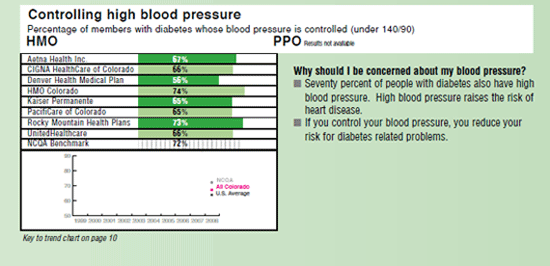Explain Why a Health Care Quality Measure Matters
In some cases, report users will not know why a particular measure is important as an aspect of quality. When people don’t realize the importance of a measure, they are unlikely to look at or use the data.1 In the case of clinical process measures, for example, consumers do not know the evidence that links specific processes to important outcomes. Why is it important not only to start an antibiotic prior to surgery, but to stop the antibiotic within a set time after surgery?
Ideally, one can create a label that clearly demonstrates the importance of a measure. For example, one can label a clinical measure such as prescribing beta blockers after a hospital discharge for heart attack as “Prescribing beta blockers at discharge to prevent future heart attacks.”
Where this is not possible, an effective strategy is to provide a sentence that links the process to one or more outcomes that are important to people. For example, explain that having a cancer screening test makes it more likely to catch the cancer early, when treatment is more likely to be effective and in some cases less disruptive to one’s life or less disfiguring.
The simplest way to do this is to include a brief section, entitled “Why is this measure important?” or something similar as shown in the example below, or enable the reader to obtain this information by selecting the measure label.
EXAMPLE: Explaining the Importance of a Measure
Title: Health Matters Health Plan and Hospital Quality Report
Sponsor: Colorado Business Group on Health
Colorado Business Group on Health’s quality reports includes brief descriptions of the measures they have included in the report. In this example, the user can read why he or she should be concerned about blood pressure.

Source: Colorado Business Group on Health. Health Matters Health Plan and Hospital Quality Report. 2008. (No longer available online.)
1 Hibbard JH, Jewett JJ. Will quality report cards help consumers? Health Aff 1997 May/Jun; 16(3): 218-28.



